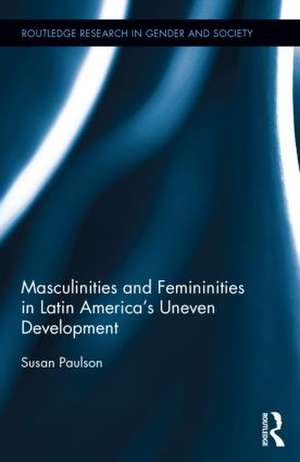Masculinities and Femininities in Latin America's Uneven Development: Routledge Research in Gender and Society
Autor Susan Paulsonen Limba Engleză Hardback – 9 sep 2015
| Toate formatele și edițiile | Preț | Express |
|---|---|---|
| Paperback (1) | 259.98 lei 43-57 zile | |
| Taylor & Francis – 30 iun 2020 | 259.98 lei 43-57 zile | |
| Hardback (1) | 1052.35 lei 43-57 zile | |
| Taylor & Francis – 9 sep 2015 | 1052.35 lei 43-57 zile |
Din seria Routledge Research in Gender and Society
-
 Preț: 310.22 lei
Preț: 310.22 lei -
 Preț: 148.25 lei
Preț: 148.25 lei -
 Preț: 312.34 lei
Preț: 312.34 lei -
 Preț: 287.05 lei
Preț: 287.05 lei -
 Preț: 278.93 lei
Preț: 278.93 lei -
 Preț: 310.45 lei
Preț: 310.45 lei - 8%
 Preț: 389.12 lei
Preț: 389.12 lei -
 Preț: 311.41 lei
Preț: 311.41 lei -
 Preț: 306.80 lei
Preț: 306.80 lei -
 Preț: 311.59 lei
Preț: 311.59 lei -
 Preț: 310.22 lei
Preț: 310.22 lei -
 Preț: 355.02 lei
Preț: 355.02 lei - 9%
 Preț: 1003.31 lei
Preț: 1003.31 lei - 5%
 Preț: 307.44 lei
Preț: 307.44 lei -
 Preț: 303.87 lei
Preț: 303.87 lei -
 Preț: 384.85 lei
Preț: 384.85 lei - 5%
 Preț: 293.44 lei
Preț: 293.44 lei -
 Preț: 386.05 lei
Preț: 386.05 lei -
 Preț: 488.71 lei
Preț: 488.71 lei -
 Preț: 348.77 lei
Preț: 348.77 lei - 9%
 Preț: 1037.87 lei
Preț: 1037.87 lei - 26%
 Preț: 821.53 lei
Preț: 821.53 lei -
 Preț: 431.35 lei
Preț: 431.35 lei -
 Preț: 497.20 lei
Preț: 497.20 lei -
 Preț: 495.51 lei
Preț: 495.51 lei - 18%
 Preț: 1060.52 lei
Preț: 1060.52 lei -
 Preț: 355.13 lei
Preț: 355.13 lei - 18%
 Preț: 1005.04 lei
Preț: 1005.04 lei - 18%
 Preț: 1116.74 lei
Preț: 1116.74 lei - 18%
 Preț: 1117.07 lei
Preț: 1117.07 lei - 25%
 Preț: 766.85 lei
Preț: 766.85 lei - 18%
 Preț: 1060.87 lei
Preț: 1060.87 lei - 18%
 Preț: 1057.05 lei
Preț: 1057.05 lei - 18%
 Preț: 1121.81 lei
Preț: 1121.81 lei - 26%
 Preț: 850.91 lei
Preț: 850.91 lei - 18%
 Preț: 1111.16 lei
Preț: 1111.16 lei -
 Preț: 480.62 lei
Preț: 480.62 lei - 18%
 Preț: 1057.09 lei
Preț: 1057.09 lei - 9%
 Preț: 1040.38 lei
Preț: 1040.38 lei - 18%
 Preț: 1112.34 lei
Preț: 1112.34 lei - 15%
 Preț: 699.79 lei
Preț: 699.79 lei - 18%
 Preț: 1163.63 lei
Preț: 1163.63 lei - 18%
 Preț: 1116.02 lei
Preț: 1116.02 lei - 18%
 Preț: 1115.33 lei
Preț: 1115.33 lei - 18%
 Preț: 946.61 lei
Preț: 946.61 lei
Preț: 1052.35 lei
Preț vechi: 1283.35 lei
-18% Nou
Puncte Express: 1579
Preț estimativ în valută:
201.39€ • 208.98$ • 168.33£
201.39€ • 208.98$ • 168.33£
Carte tipărită la comandă
Livrare economică 17-31 martie
Preluare comenzi: 021 569.72.76
Specificații
ISBN-13: 9781138843691
ISBN-10: 1138843695
Pagini: 182
Dimensiuni: 152 x 229 x 17 mm
Greutate: 0.39 kg
Ediția:1
Editura: Taylor & Francis
Colecția Routledge
Seria Routledge Research in Gender and Society
Locul publicării:Oxford, United Kingdom
ISBN-10: 1138843695
Pagini: 182
Dimensiuni: 152 x 229 x 17 mm
Greutate: 0.39 kg
Ediția:1
Editura: Taylor & Francis
Colecția Routledge
Seria Routledge Research in Gender and Society
Locul publicării:Oxford, United Kingdom
Public țintă
Postgraduate and UndergraduateCuprins
Introduction: Sociocultural Processes That Produce, Sustain and Sometimes Transform Uneven Geographies of Development 1. Why Has Gendered Change Been So Uneven? 2. Movements Across Latin America in Realms Identified as Masculine and as Feminine 3. In the Wake of Occupational Transformation and Pro-Equity Legislation: What’s Driving New Exclusions in Yucatán? Susan Paulson and Jimena Méndez Navarro 4. The Gendered Production of Working Bodies and Aquaculture Industry in Chiloé, Chile Susan Paulson and Teresa Bornschlegl 5. Dynamics Shaping Andean Landscapes, Agrobiodiversity and Foodstuff 6. Gender and Territory as Interacting Socio-Ecological Processes. Conclusion: Power and Resilience in Gender-Territory Innovations.
Recenzii
"Susan Paulson’s exciting and original text challenges the current thinking about gender in social sciences. Her unique contribution to gender scholarship is not only the focus on men and masculinity but also the ability to intersect socioeconomic gender differences with the concept of territoriality. In the three case studies and her insightful analytical chapters, Paulson poses critical questions about men and masculinity in Latin America in order to ask how individuals and communities strive to produce territories that provide sustainable communities, economies and ecologies. The book is a theoretical triumph that provides new ways to see and understand ongoing processes of gender relations in the sociocultural and biophysical spaces of Latin America’s continuing uneven development."
-Wendy Harcourt, Associate Professor in Critical Development and Feminist Studies, International Institute of Social Studies of Erasmus University Rotterdam (ISS/EUR), The Netherlands
"This book provides a welcome ‘correction’ to the woman-centered bias in the field of gender and development. Paulson demonstrates how analyses which focus solely on women not only miss half the story, but are also unsatisfactory without attention to the complex ways that gender intersects with class, race and ethnicity, and space, among other factors. Case studies drawn from Mexico, Chile and Bolivia well illustrate her main point, that gender arrangements and dynamics influence the evolution of institutions and environments. By analyzing how gender systems impact upon and are impacted by broader processes of socioeconomic and cultural change she illustrates how these dynamics can sometimes produce greater gender equity while at the same time exacerbating other forms of inequality, and vice versa. This book should be required reading in gender and development courses; it should also serve as a stimulating complementary text in courses on Latin American anthropology, geography and economic development."
-Carmen Diana Deere, Distinguished Professor of Latin American Studies and Food & Resource Economics, University of Florida
"This is a brilliant, indeed an indispensable book. It provides a compelling diagnosis of the decline and failure of the contemporary bureaucratic and managerially governed university, the post-industrial-bureaucratic driven economy, and the social-liberal-democratic-bureaucratic state."
-Wayne Cristaudo, Journal of Economics Library (Volume 3, 2016)
"The framework brilliantly developed by Paulson reflects important long and broad collaborative research from Latin Americans and Latinoamericanists coming from different fields and disciplines, mainly under the support of RIMISP (Red International de Metodología de Investigación de Sistemas de Producción) and her own research engagement with this region for more than two decades, which produced important scholarship on ethnic and gender identities and their role in changes in the use of territory.There is no doubt that this book is a major milestone for shifting the conceptualization and practice addressing gendered “sociocultural processes that produce, sustain and sometimes transform uneven geographies of development” [1]. It can open up a new way of understanding gender, leading to more equitable and sustainable development."
-Cristina Espinosa, E-International Relations (2016)
"There is no doubt that this book is a major milestone for shifting the conceptualization and practice addressing gendered "sociocultural processes that produce, sustain and sometimes transform uneven geographies of development". It can open up a new way of understanding gender, leading to more equitable and sustainable development."
-E-International Relations
-Wendy Harcourt, Associate Professor in Critical Development and Feminist Studies, International Institute of Social Studies of Erasmus University Rotterdam (ISS/EUR), The Netherlands
"This book provides a welcome ‘correction’ to the woman-centered bias in the field of gender and development. Paulson demonstrates how analyses which focus solely on women not only miss half the story, but are also unsatisfactory without attention to the complex ways that gender intersects with class, race and ethnicity, and space, among other factors. Case studies drawn from Mexico, Chile and Bolivia well illustrate her main point, that gender arrangements and dynamics influence the evolution of institutions and environments. By analyzing how gender systems impact upon and are impacted by broader processes of socioeconomic and cultural change she illustrates how these dynamics can sometimes produce greater gender equity while at the same time exacerbating other forms of inequality, and vice versa. This book should be required reading in gender and development courses; it should also serve as a stimulating complementary text in courses on Latin American anthropology, geography and economic development."
-Carmen Diana Deere, Distinguished Professor of Latin American Studies and Food & Resource Economics, University of Florida
"This is a brilliant, indeed an indispensable book. It provides a compelling diagnosis of the decline and failure of the contemporary bureaucratic and managerially governed university, the post-industrial-bureaucratic driven economy, and the social-liberal-democratic-bureaucratic state."
-Wayne Cristaudo, Journal of Economics Library (Volume 3, 2016)
"The framework brilliantly developed by Paulson reflects important long and broad collaborative research from Latin Americans and Latinoamericanists coming from different fields and disciplines, mainly under the support of RIMISP (Red International de Metodología de Investigación de Sistemas de Producción) and her own research engagement with this region for more than two decades, which produced important scholarship on ethnic and gender identities and their role in changes in the use of territory.There is no doubt that this book is a major milestone for shifting the conceptualization and practice addressing gendered “sociocultural processes that produce, sustain and sometimes transform uneven geographies of development” [1]. It can open up a new way of understanding gender, leading to more equitable and sustainable development."
-Cristina Espinosa, E-International Relations (2016)
"There is no doubt that this book is a major milestone for shifting the conceptualization and practice addressing gendered "sociocultural processes that produce, sustain and sometimes transform uneven geographies of development". It can open up a new way of understanding gender, leading to more equitable and sustainable development."
-E-International Relations
Descriere
This book explores the relations between gender and key historical processes playing out on various geographical scales in Latin America over the past 25 years, integrating critical approaches to men and masculinity with long-evolving woman-focused work on gender and development to consider how roles and resources associated with gender identities interact with institutions and landscapes over space and time. The analysis sheds light on socio-economic, political and environmental change in different parts of Latin America, and the dialectical relation between uneven geographies of development and the sociocultural institutions that produce, sustain or transform unequal spaces.












